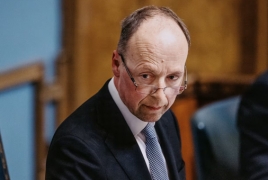
Finland’s Eduskunta Speaker, Jussi Halla-aho, underlined the significance of Armenia’s economic, trade, and security integration with the European Union, emphasizing the need for ongoing reforms in the country, Armenpress reports.
"We fully support Armenia's economic, trade, and security integration with the EU. However, obstacles exist, such as Armenia's membership in the CSTO and the Eurasian Economic Union, as well as Russia's military presence. The depth of EU integration directly depends on the Armenian people's willingness to embrace and implement changes. It is crucial that reforms continue, not for the EU, but for the Armenian people themselves. These reforms will make Armenia more resilient and strengthen its society. We are ready to encourage Armenians to pursue the reforms we have discussed," Halla-aho stated.
He added that Armenia should gradually reduce its dependence on Russia to foster closer ties with European institutions.
"Our discussions made it clear that Armenians are ready to move in this direction. Therefore, the European integration process and the effort to move out of Russia's sphere of influence should proceed simultaneously. Finland, having been part of the Russian Empire, understands Armenia's challenges well," the official noted.
Commenting on the Armenia-Azerbaijan conflict resolution process, Halla-aho stressed the importance of the EU continuing its monitoring mission along the Armenia-Azerbaijan border to reduce tensions and prevent minor escalations.
"Additionally, a permanent resolution is needed to normalize Armenia's relations with all its neighbors. We will raise these issues during our bilateral negotiations with Turkey and Azerbaijan," he added.
On January 9, Armenia's government approved a draft proposal to begin the EU membership process, submitted by the "EuroVote" civic initiative. The draft will soon be debated in Armenia’s parliament.
The EU will analyze the draft approved by Armenia's government to initiate the membership process and discuss it with Armenian authorities, said Anita Hipper, EU’s chief spokesperson for foreign affairs and security policy.

